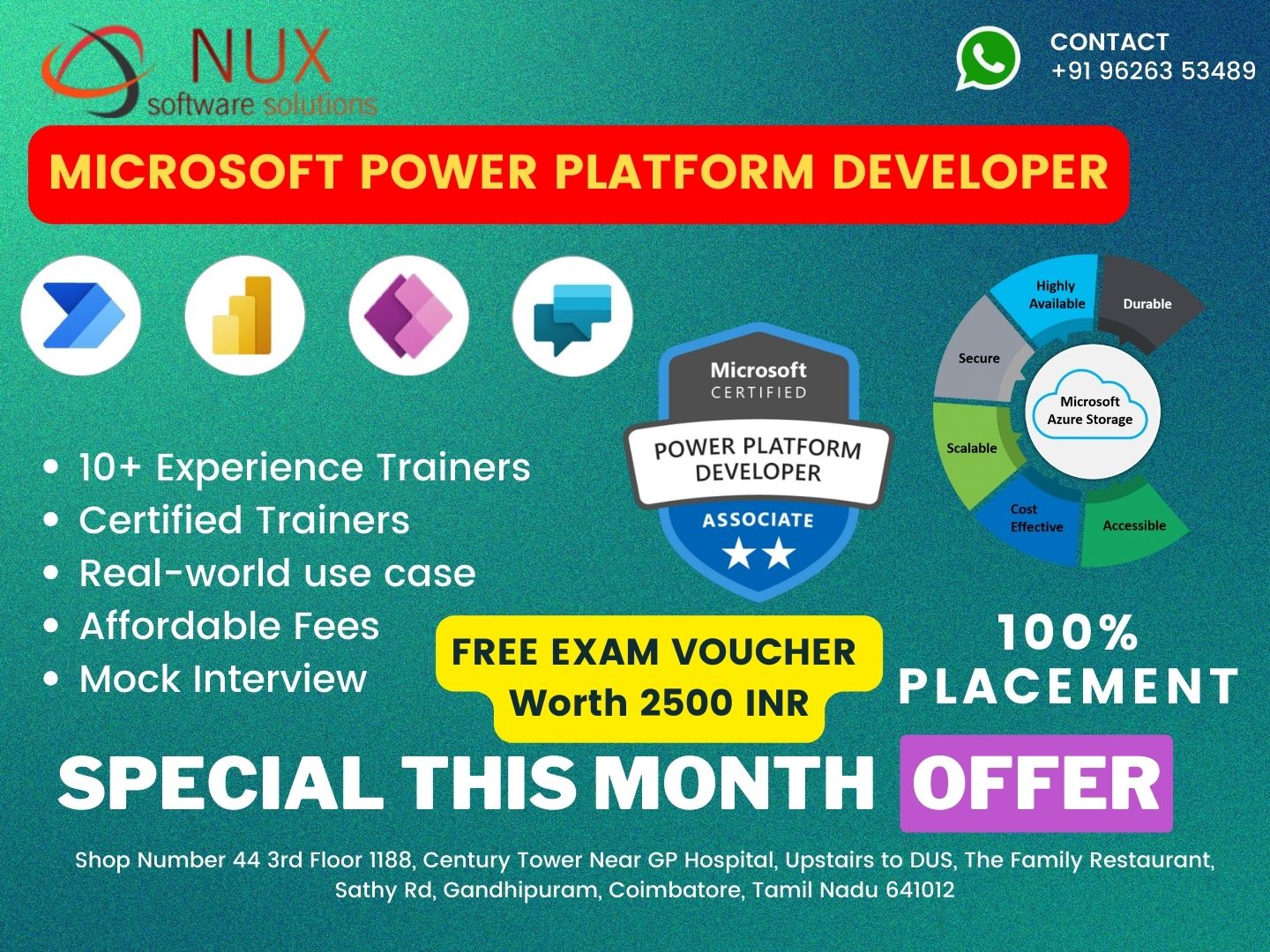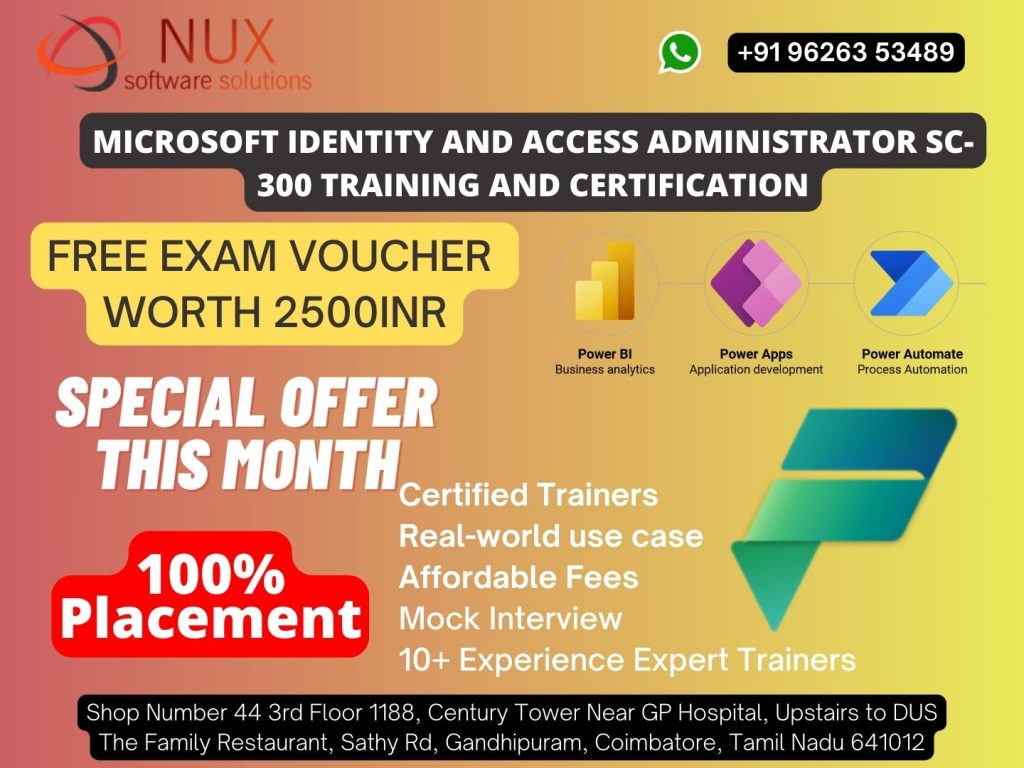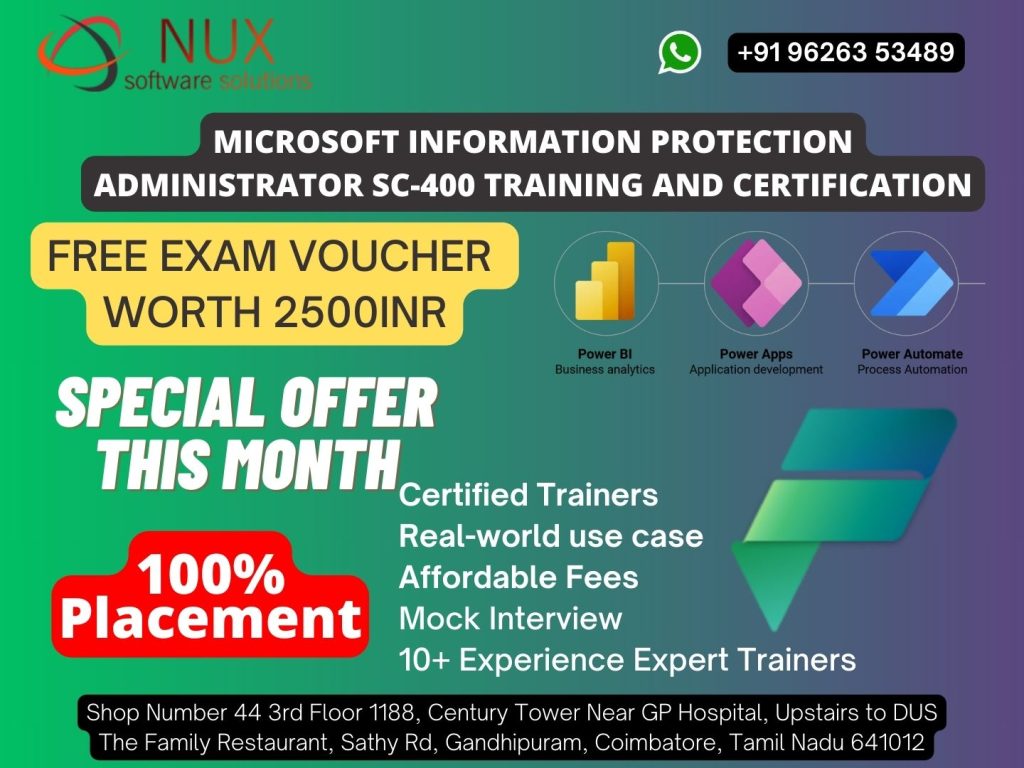Microsoft Power Platform Developer PL-400

Microsoft Power Platform Developer (PL-400) Training and Certification in Coimbatore
Transform your development career with our Microsoft Power Platform Developer (PL-400) Training in Coimbatore. This course is specifically designed for developers who want to build powerful, scalable, and secure solutions using Microsoft Power Platform components such as Power Apps, Power Automate, Power BI, and Microsoft Dataverse.
The PL-400 certification helps professionals demonstrate their expertise in designing, developing, securing, and extending business applications using the Microsoft Power Platform. This course provides hands-on training that blends low-code/no-code development with traditional pro-code tools like Azure services and JavaScript.
Why Choose This Course?
-
Microsoft Official Curriculum tailored to PL-400 exam objectives
-
Developer-Focused Approach to building custom Power Platform solutions
-
Hands-On Labs using Visual Studio, Azure Functions, and Dataverse APIs
-
Learn from Certified Experts with real-world Power Platform project experience
-
Boost Your Career as a Microsoft Certified: Power Platform Developer Associate
What You Will Learn
-
Building model-driven and canvas Power Apps
-
Creating custom connectors and components
-
Automating business workflows with Power Automate and AI Builder
-
Integrating Power Platform with Azure services and REST APIs
-
Implementing security, user access, and identity management
-
Extending Dataverse with server-side logic using plugins and web resources
-
Managing solution deployment and ALM (Application Lifecycle Management)
Who Should Enroll?
-
Developers and technical professionals working with Microsoft 365 and Azure
-
IT professionals experienced with JavaScript, .NET, or TypeScript
-
Power Platform users looking to become certified developers
-
Candidates preparing for the PL-400 certification exam
-
Anyone building enterprise-level apps and integrations in Microsoft ecosystems
Course Features
-
Instructor-led training with real-time coding demonstrations
-
Sandbox environment with Power Platform and Azure integrations
-
PL-400 exam preparation, mock tests, and certification support
-
Developer-focused assignments and project guidance
-
Career mentoring and placement support
Step into the world of intelligent business applications with the PL-400 Training in Coimbatore. Learn how to develop robust Microsoft Power Platform solutions that drive business transformation and innovation.
Microsoft Power Platform Developer PL-400 Syllabus
Modules
Create a technical design (10-15%)
Design technical architecture
– Design the technical architecture for a solution
– Design the authentication and authorization strategy
– Determine whether requirements can be met with out-of-the-box functionality
– Determine where to run business logic including cloud computing, client-side processing, business rules, plug-ins, and Power Automate
– Determine when to use standard tables, virtual tables, elastic tables, or connectors
– Determine the impact of security features of the Microsoft Power Platform including data loss prevention (DLP) policies, security roles, teams, business units, and row sharing on your business solution
Design solution components
– Design Power Apps reusable components including canvas components, code components, and client scripting
– Design custom connectors
– Design Dataverse code components including plug-ins and Custom APIs
– Design automations including Power Automate cloud flows
– Design inbound and outbound integrations using Dataverse and Azure
Build Power Platform solutions (10-15%)
Configure and troubleshoot Microsoft Power Platform
– Troubleshoot operational security issues found in testing
– Configure Dataverse security roles to support code components
– Manage Microsoft Power Platform environments for development
Implement application lifecycle management (ALM)
– Manage solution dependencies
– Create and use environment variables
– Determine when to use unmanaged and managed solutions
– Manage solution layers
Implement Power Apps improvements (5-10%)
Implement advanced canvas apps features
– Implement complex Power Fx formulas
– Build reusable component libraries
– Utilize Power Automate cloud flows to implement business logic from a canvas app
Optimize and troubleshoot apps
– Troubleshoot canvas and model-driven app issues by using Monitor and other browser-based debugging tools
– Optimize canvas app performance including pre-loading data and query delegation
– Optimize model-driven app performance including forms and views
Extend the user experience (10-15%)
Apply business logic in model-driven apps using client scripting
– Build JavaScript code that targets the Client API object model
– Determine event handler registration approach
– Create client scripting that targets the Dataverse Web API
– Configure commands and buttons using Power Fx
– Configure commands and buttons using JavaScript
Create a Power Apps Component Framework (PCF) code component
– Demonstrate the use of the different code component lifecycle events
– Initialize a new code component
– Configure a code component manifest
– Implement component interfaces
– Package, deploy, and consume a component
– Configure and use Device, Utility, and Web API features in component logic
Extend the platform (40-45%)
Create a Dataverse plug-in
– Demonstrate the use of the different event execution pipeline stages
– Develop a plug-in that uses the execution context
– Develop a plug-in that implements business logic
– Implement Pre Images and Post Images to support plug-in logic
– Perform operations in plug-ins by using the Organization service
– Optimize plug-in performance
– Configure a Dataverse custom API message
– Register plug-in components by using the Plug-in Registration Tool
– Develop a plug-in that implements a custom API
– Configure Dataverse business events
Create custom connectors
– Create an Open API definition for an existing REST API
– Implement authentication for custom connectors
– Configure policy templates to modify connector behavior at runtime
– Import definitions from existing APIs including Open API definitions, Azure services, and GitHub
– Create a custom connector for an Azure service
– Develop an Azure Function to be used in a custom connector
– Extend the Open API definition for a custom connector
– Develop code for a custom connector to transform data
Use platform APIs
– Perform operations with the Dataverse Web API
– Perform operations with the Organization service
– Implement API limit retry policies
– Optimize for performance, concurrency, transactions, and bulk operations
– Perform authentication by using OAuth
Process workloads by using Azure Functions
– Process long-running operations by using Azure Functions
– Configure scheduled and event-driven triggers in Azure Functions
– Authenticate to Microsoft Power Platform by using managed identities
Configure Power Automate cloud flows
– Implement flow steps to use Dataverse connector actions and triggers
– Implement complex expressions in flow steps
– Manage sensitive input and output parameters
– Implement Azure Key Vault and Microsoft Entra ID service principals
– Implement flow control actions including error handling
– Configure trigger filter and retry policies
– Develop reuseable logic by using child flows
Develop Integrations (5-10%)
Publish and consume Dataverse events
– Publish a Dataverse event by using the IServiceEndpointNotificationService
– Publish a Dataverse event by using the Plug-in Registration Tool
– Register service endpoints including webhooks, Azure Service Bus, and Azure Event Hub
– Recommend options for listening to Dataverse events
Implement data synchronization with Dataverse
– Perform data synchronization by using change tracking
– Develop code that utilizes alternate keys
– Utilize the UpsertRequest message to synchronize data



